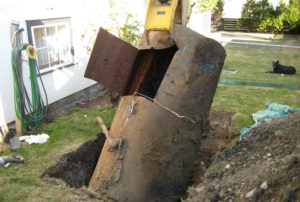Your Guide to the Home Inspection Process
There’s often a feeling of uncertainty when deciding if you want to “pull the trigger” and make an offer on a home. So many unknowns!
“What’s the deal with the foundation?” “Is that crack in the ceiling a bad sign?” “Is the electrical in this room up to code?”

A good Realtor can help with many of these questions, but you won’t know everything about the house until you have it professionally inspected. This step only happens once you make an offer and it’s accepted by the seller.
A certified home inspector really takes a close look at the house and, for many home purchasers; it’s often the most stressful time in the home buying process. – But it doesn’t have to be!
If you have clear expectations, you can get through it easily and be on your way to moving day.
The first thing you need to know about your home inspection:
You’ll feel a myriad of emotions.
First there’s excitement. The inspection could be the longest time you’ve been in the house, after the showings.
Then there’s anxiety. What if the inspector finds something wrong? So wrong you can’t buy the house?
Finally, there’s impatience. Seriously, is this whole home-buying process over yet?
Not yet. But you’re close!
You will typically have up to ten business days to complete inspections and present the seller with any requested repairs. In the Portland area, it’s common to have a general home inspection, as well as, a sewer scope, radon test, and underground oil tank search.
Let’s review all 4 inspection types:
 General Home Inspection
General Home Inspection
- Typically takes 2-3 hours depending on home size. The cost varies, but plan to budget between $400-$500 for it. (Yes, you have to pay for ALL inspections yourself…congrats; it’s your first homeowner expense!)
- Once finished, the inspector will share initial results with you, highlighting any areas of concern. There will be a formal report later that you and your Realtor can review in more detail to determine the next steps.
- Keep in mind that the report will highlight only the negatives of the home. At first glance, it can feel like there’s so much wrong (and maybe there is!), but it’s important to remember there’s plenty right with it, it’s just not in the report.
- When sifting through the report details, don’t sweat the small stuff and focus on “The Big 3”:
- Structural (siding, foundation, roof, chimney, etc.)
- Safety/Health (loose/missing railings or stairs, bad wiring, pests)
- Systems (furnace, water heater, plumbing)
- Remember, items large and small that are not completely perfect will be in the report. It will cover everything from serious stuff to a loose handle on a drawer. While everyone wants to move in with as little to fix as possible, stay focused on the “big ticket” items such as a new roof, sewer line, or foundation work. Save the inexpensive stuff for later.
- Your Inspector Won’t Check Everything – Generally, inspectors only examine houses for problems that can be seen with the naked eye. They won’t be tearing down walls or using magical X-ray vision to find hidden faults. Also, your general inspection does not include:
- fireplaces
- garages, shops or out-buildings
- pools
Sewer Scope

This inspection takes an hour or less in most cases and costs about $150. This involves a small camera attached to a pipe that snakes its way into the sewer line. The inspector is looking to see if there is a clean line from your house to the street and if there is any damage along the way. The most common issue that can be found here is root intrusion (like it sounds; tree roots have started growing into the line), and a party sewer (not as fun as it sounds; your line meets with the neighbors’ line before it goes to the street). If either of these is found, your Realtor will likely recommend asking the seller to repair them.
Sewer issues are more common in older homes, but you never know!
Radon Testing
 Testing radon may be unfamiliar to some, but it’s serious stuff! In a nutshell, radon is an odorless, naturally occurring radioactive gas found in granite rich soil and is common here in our lovely Portland rain forest. Radon is in the air all around us. There’s nothing to fear if it’s not in an enclosed space, but exposure to elevated levels in a confined area has been shown to cause lung cancer over time. You can learn more here
Testing radon may be unfamiliar to some, but it’s serious stuff! In a nutshell, radon is an odorless, naturally occurring radioactive gas found in granite rich soil and is common here in our lovely Portland rain forest. Radon is in the air all around us. There’s nothing to fear if it’s not in an enclosed space, but exposure to elevated levels in a confined area has been shown to cause lung cancer over time. You can learn more here
Testing costs about $100 and involves simply placing a small monitoring device in the lowest livable area of the home. Results are measured after 3 days. The EPA suggests a reading over 4pCi/L should be corrected. Typically the seller will fix the issue by installing a ventilation fan (often in the basement) that vents out along the side of the home keeping levels low and steady.
Underground Oil Tank Search
 This is not always necessary, but if you or your Realtor sees that there may have been oil heat in the past and you don’t find a record of decommissioning, you should get it done! Most old homes around Portland were heated with oil back in the day (many still are), and while oil heat can be just fine, an old neglected tank is not! Old tanks can corrode over time, leaking oil and sludge into the soil that can seriously mess up your gardening plans.
This is not always necessary, but if you or your Realtor sees that there may have been oil heat in the past and you don’t find a record of decommissioning, you should get it done! Most old homes around Portland were heated with oil back in the day (many still are), and while oil heat can be just fine, an old neglected tank is not! Old tanks can corrode over time, leaking oil and sludge into the soil that can seriously mess up your gardening plans.
The search costs about $100. If a tank is found, a Soil Test is recommended to determine if there has been any contamination. As with radon, the seller generally expects to pay for decommissioning.
Your Next Steps
 At this point, if you have concerns over any of the inspection results, you have 3 options:
At this point, if you have concerns over any of the inspection results, you have 3 options:
- Ask the seller to repair specific items at their expense
- You don’t want to send them a laundry list of a million things, but anything from “The Big 3” should be considered.
- Request a credit to pay for those repairs
- I’m a big fan of requesting credits. That way you can determine for yourself who will do the work, plus those credits will go towards paying off your closing costs.
- Walk away and find another house
- Every situation is unique and while most homes are in good enough shape so that a credit or a few fixes make both the seller and buyer happy, sometimes it’s best to cut your losses and move on.
That’s It!
There’s more to it, but that’s the basics. If you or someone you know is considering buying a home, let’s chat about the specifics and make a plan together.